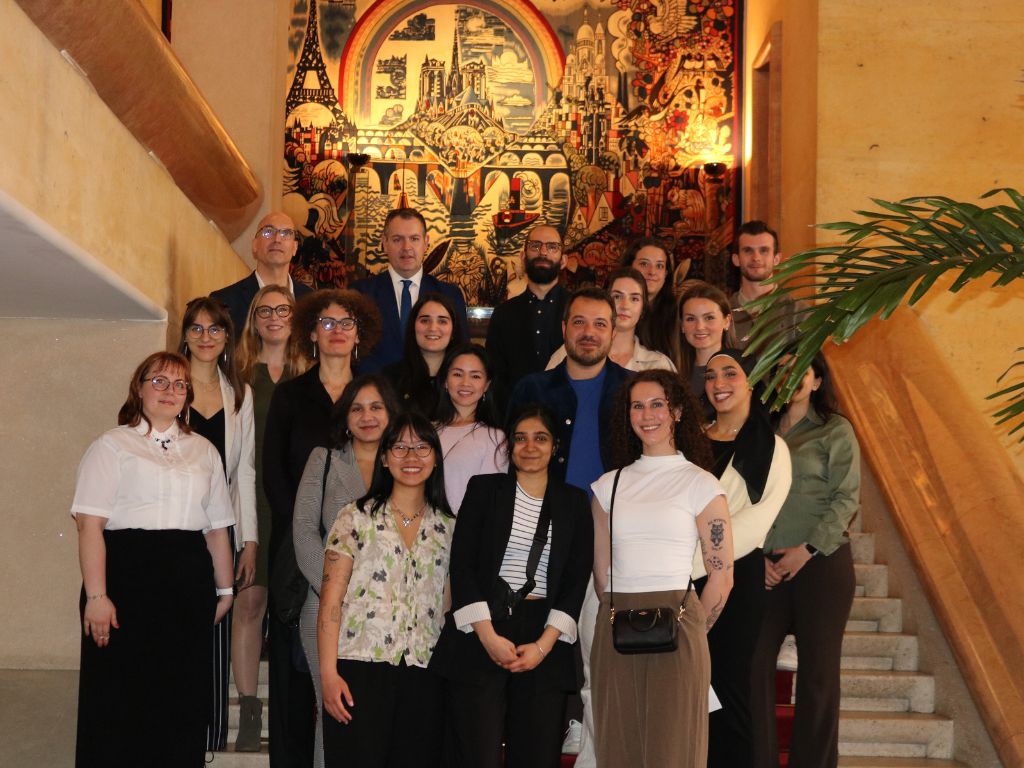Language and Intercultural Relations student, Natasha Pendawa, participates in Choix Goncourt Canada decision
My name is Natasha Pendawa (she/her), I am in my fourth and final year of the Language and Intercultural Relations (LIR) program at Toronto Metropolitan University (TMU).
In October 2023, the inaugural Choix Goncourt Canada literary competition (external link) was initiated by the Embassy of France, joining a network of more than 35 similar competitions globally under the sponsorship of the Académie Goncourt.
The Embassy of France intends to foster a living and shared experience of contemporary French literature on Canadian university campuses. The Choix Goncourt Canada competition is also a way to promote French and French-language studies and teaching. Toronto Metropolitan University was one of seven English-speaking universities in Canada to join the inaugural literacy competition.

Natasha Pendawa (front left) and other student representatives at the French Embassy in Ottawa
I was first introduced to Choix Goncourt Canada during the past winter semester. I enrolled in FRE 706: Life Times of French Language taught by Dr. Catherine Gaughan. Near the end of our third class, Dr. Gaughan extended an invitation to students keen on joining Choix Goncourt Canada, alongside their peers and professors. I knew I wanted to take advantage of any opportunities that included French and intercultural communication with hopes to improve my reading, oral and overall comprehension of the French language while wrapping up my undergrad studies at TMU. I reached out to Dr. Gaughan for further information and she responded with details indicating a bi-weekly Zoom meeting with two other professors, Dr. Lara Popic and Dr. Nazanin Shahdi, alongside other students who indicated their interest in joining as reading panelists. The books on the shortlist of last year’s Prix Goncourt, a prize in French literature given by the académie Goncourt to the author of "the best and most imaginative prose work of the year.”
There were two students in the TMU chapter of the Choix Goncourt Canada, Elizabeth Hoppe, a first-year LIR student and myself. We discussed four books over the semester:
- Sarah, Susanne et l’écrivain, by Éric Reinhardt (Gallimard)
- Humus, by Gaspard Kœnig (L’Observatoire)
- Triste Tigre, by Neige Sinno (POL)
- Veiller Sur Elle, by Jean-Baptiste Andrea (L’Iconoclaste)
Our goal as a group was not only to have meaningful conversations about each book but to send a TMU student delegate in a panel discussion with other students from English-speaking universities across Canada to act as a jury and decide which book out of the four would be Canada’s Goncourt “choice” (hence, “Choix” Goncourt Canada).
With help from our professors, Elizabeth and I discussed and analyzed the books with a genuine interest in understanding the authors, from their perspectives, and intentions on pursuing their themes to our own interpretations. At our final reading panel as a group, we decided on Triste Tigre by Neige Sinno as the book of our choice to be considered the Choix Goncourt Canada.
On May 2nd, 2024, Dr. Popic and I travelled to the Embassy of France in Ottawa to convene with representatives from other universities and partake in the deliberation period and ceremony, all on the same day. The winner of the Choix Goncourt Canada literary competition was decided collectively to be awarded to Neige Sinno with her novel Triste Tigre. Seven universities in total sent one student delegate to act as a jury in the discussion panel. There were representatives from the University of Ottawa, Queen’s University, University of New Brunswick, University of British Columbia, University of Calgary, University of Alberta and TMU.
Natasha Pendawa and other student representatives at the decision table
As an LIR student, I felt very proud to represent my program and the Languages, Literatures and Cultures Department at such an important event. The Prix Goncourt symbolizes the love of books and literature, an element that I needed a reminder of. This was a quote from Mahir Guven, the 2018 Prix Goncourt winner and guest of honour at the first Choix Goncourt Canada competition, that I felt relevant to share, “a literary prize is a way of getting people talking about books. To share. To debate. To put books at the center. To make books loved by those who have lost their way on the pages, to make them loved by those who have never found it, to enable them to experience the great joy of reading.”
I am lucky that similar opportunities are presented to LIR students quite often, meaning that we have a lot of experiential learning opportunities to choose from and I am very grateful for my time in the LIR community. I hope I’ve made my department proud and that my experience encourages future students to seek opportunities that highlight their undergraduate journey.